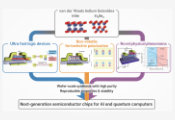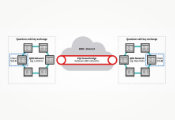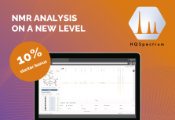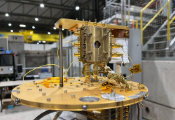New Mexico’s Quantum Moonshot Selected as Finalist for NSF’s Regional Innovation Engines Program
Albuquerque, NM, November 20, 2024 -- The New Mexico Quantum Moonshot, a groundbreaking initiative designed to catalyze the state’s leadership in quantum information technologies (QIT), has been invited to submit a full proposal to the National Science Foundation’s (NSF) prestigious Regional Innovation Engines program. As one of only four quantum-focused ecosystems in the country invited to this stage, this recognition highlights New Mexico’s potential to become a global powerhouse in quantum technology, with the aim of leveraging the state’s unique combination of national security, academic, and industry assets to create transformative economic growth and ensure national security.
The New Mexico Quantum Moonshot is centered around a dual-use approach, developing quantum technologies with both civilian and military applications. The stakes couldn’t be higher, with Quantum Moonshot eligible for up to nearly $500m in support to address critical technological and ecosystem challenges to position New Mexico as a key scientific and commercial player in the emerging quantum economy.
“We are excited and honored to be selected as a finalist in the NSF’s Regional Innovation Engines program,” said Jake Douglass, Sandia’s Quantum Business Development Lead and co-PI on the Engine proposal. “This opportunity allows us to harness New Mexico’s unparalleled quantum research and national security assets to fuel innovation, build infrastructure, and create high-quality jobs in one of the most promising fields of the future. Our goal is to use quantum technology as a catalyst for economic diversification and workforce development in the region.”
The Quantum Future: New Mexico’s Unique Advantage
The New Mexico Quantum Moonshot will capitalize on the state’s extraordinary concentration of quantum research resources. Northern New Mexico, home to renowned institutions such as Sandia National Laboratories and Air Force Research Lab, along with regional partners like Los Alamos National Laboratories, is recognized as one of the largest U.S. cluster of national security quantum assets. These institutions, with combined annual budgets exceeding $7.4 billion, are at the forefront of quantum R&D, attracting top-tier researchers from around the world. This national security expertise is complemented by the world-renowned quantum science and theory at the University of New Mexico.
“The Mountain West is primed to lead the world in quantum technologies,” said Zach Yerushalmi, CEO of Elevate Quantum. “With the rich history of collaboration between New Mexico and Colorado, as well as world-class facilities and expertise, this initiative will drive the next generation of quantum breakthroughs.”
The Quantum Moonshot initiative will focus on two key components to propel the region’s quantum ecosystem forward: Grand Challenges and Place-Based Capacity Building (PBCB).
Driving Innovation Through Grand Challenges
The first prong, Grand Challenges, will target dual-use technologies with the potential to revolutionize both national security and civilian markets. By addressing critical challenges in areas like clean energy, materials science, and communications, the program aims to fast-track the development and deployment of quantum innovations. Core partners in this effort include Sandia National Labs, Los Alamos National Labs, and many major commercial players in the tech and quantum ecosystem.
The Grand Challenges approach will bring together diverse teams of experts to develop cutting-edge solutions that bridge the gap between military needs and civilian applications. With the support of industry leaders and federal resources, these teams will work to solve pressing national security issues while creating new market opportunities in quantum technologies.
Building Capacity for Future Innovation
The second prong, Place-Based Capacity Building (PBCB), will address the gap between groundbreaking research and real-world applications. The program’s PBCB strategy focuses on strengthening the region’s infrastructure, workforce, and entrepreneurial ecosystem to streamline the commercialization of quantum technologies.
By fostering collaboration among academic institutions like the University of New Mexico, Sandia National Labs, and the Colorado School of Mines, Quantum Moonshot will facilitate the transition from lab-based innovations to scalable, market-ready solutions. The initiative will also address workforce development, ensuring that New Mexico’s diverse talent pool is equipped with the skills needed to thrive in the quantum economy.
“New Mexico’s intellectual capital is unmatched, with the right infrastructure in place we have the opportunity to bring groundbreaking innovations to market,” said Alex Greenberg, Economic Development Advisor for the Governor of New Mexico. “Through this initiative, we aim to remove the bottlenecks that prevent commercialization and leverage our unique assets to position New Mexico as the epicenter of quantum development.”
Investing in New Mexico’s Future
The Quantum Moonshot proposal also received strong support from Governor Michelle Lujan Grisham. This strategic support will help address the challenges of translating world-class research into tangible economic growth, positioning New Mexico as a leader in the global quantum race.
A Collaborative, Inclusive Future for New Mexico
As a finalist in the NSF’s Regional Innovation Engines program, the Quantum Moonshot initiative is poised to attract significant federal and private funding to accelerate quantum technology development. This investment will not only fuel innovation but also create diverse, high-paying jobs across the state, strengthening New Mexico’s economy and ensuring national security in the decades to come.
The next steps for the Quantum Moonshot will involve refining its proposal and engaging with local and national stakeholders to build a comprehensive ecosystem for quantum innovation. The NSF is expected to announce the final funding decisions midway through 2025.




































